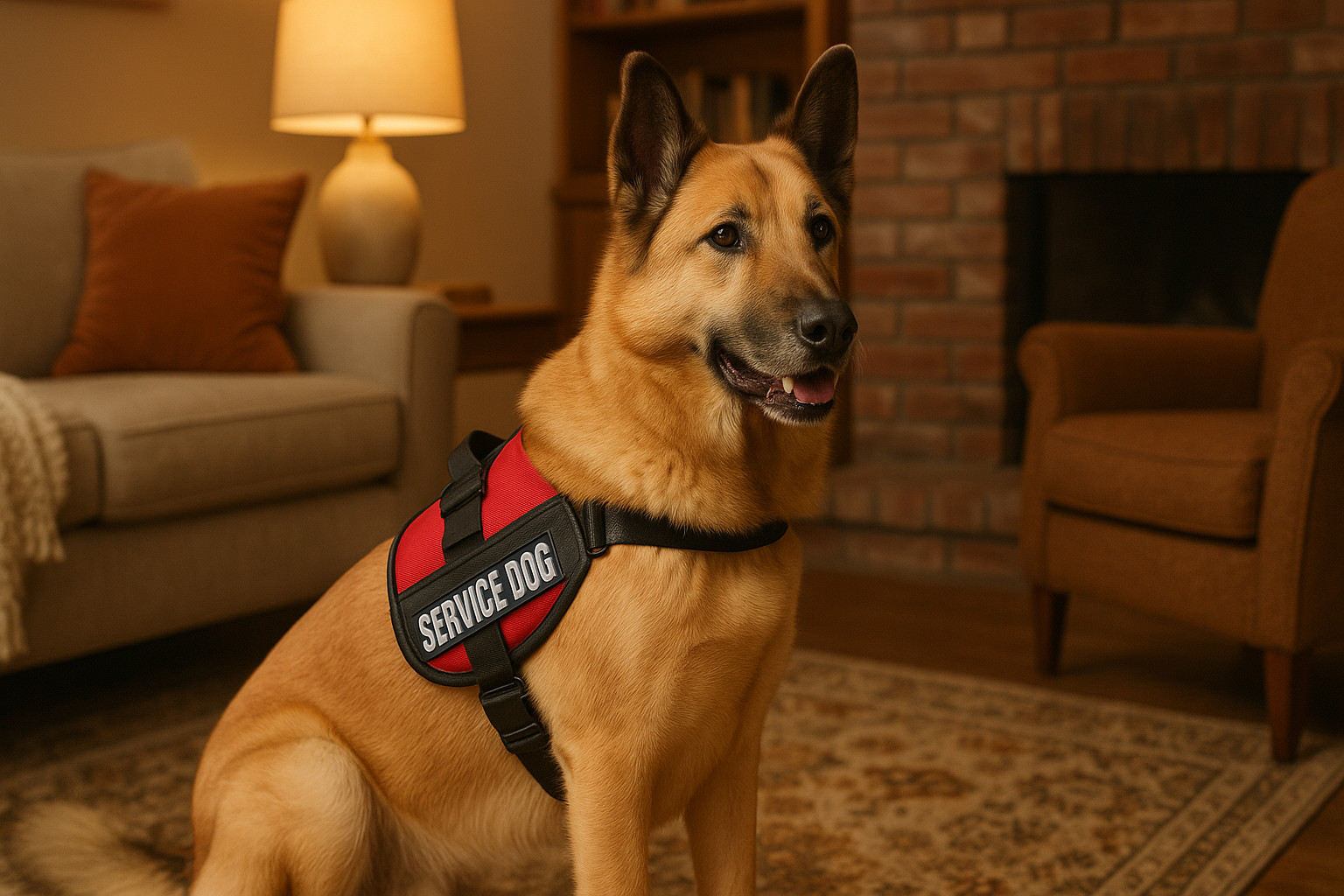Chinook as a Service Dog
Get Your Documents

The Chinook, originally bred in New Hampshire as a sled dog, is a powerful yet gentle breed. Known for their endurance, strength, and cooperative nature, Chinooks have a history tied to exploration and work. However, how do these traits translate to serving as a service dog in today’s society? This article explores the Chinook’s suitability for service dog roles, examining various attributes such as physical characteristics, temperament, training potential, and health considerations.
Chinook Overview
Chinooks are a relatively rare breed, encompassing a unique mix of attributes from their sled dog ancestry and their gentle demeanor. They are known for being hardworking, reliable, and highly trainable. Their distinctive combination of qualities can make them ideal service animals for certain roles, although their rare status can be a limiting factor.
Physical Characteristics
Chinooks are medium to large-sized dogs, with males typically standing between 23 to 27 inches at the shoulder and weighing between 55 to 90 pounds. Females are slightly smaller, with a height ranging from 21 to 25 inches and weighing between 50 to 65 pounds. Their robust and muscular build makes them suitable for physically demanding tasks.
- Strength and Size: Chinooks have the physical strength necessary for various service tasks, particularly those requiring pulling or carrying. This makes them excellent candidates for mobility assistance roles, where strength and endurance are paramount.
- Coat and Maintenance: Chinooks have a double coat that requires regular grooming to stay in good condition. Their coat is weather-resistant, which benefits them in varying climates, but they may not be ideal in extremely hot environments due to their thicker fur.
- Energy and Exercise Needs: Originally bred for long-distance sledding, Chinooks have high energy levels. They require substantial daily exercise to maintain their physical and mental health, which can be both an advantage and a challenge in service dog roles that require long periods of downtime.
Temperament and Attitude
Chinooks are known for their friendly and calm demeanor, both of which are essential traits for a service dog. Their temperament contributes significantly to their potential success in various service roles.
- Gentle Nature: Chinooks exhibit a generally gentle and non-aggressive nature, making them suitable for work in environments involving children or vulnerable adults. Their calm presence can be reassuring, aiding in emotional support roles.
- Sociability: Known for their social disposition, Chinooks typically interact well with people and other dogs. This sociability is an asset in public service settings where a dog must remain composed despite numerous distractions.
- Intelligence and Trainability: Chinooks are intelligent, facilitating training. However, they also possess an independent streak, which, without proper guidance, could lead to challenges in obedience. A consistent and positive training regimen is essential to harness their capabilities effectively.
Types of Service Work
While Chinooks possess many qualities that could facilitate service work, certain types of service roles align particularly well with their attributes.
- Mobility Assistance: Given their physical strength and size, Chinooks can be trained to assist with mobility-related tasks, such as pulling wheelchairs, fetching items, and providing balance support to individuals with mobility impairments.
- Therapy and Emotional Support: The Chinook’s friendly and stable demeanor makes them excellent candidates for therapy and emotional support roles. They can provide comfort and companionship to individuals dealing with psychological or emotional challenges.
- Search and Rescue: Chinooks have a history of working in challenging environments, which can translate to skills required in search and rescue operations. Their endurance and problem-solving abilities are significant assets in performing these demanding tasks.
Health Considerations
Health considerations are pivotal in determining a breed’s suitability for service roles. Chinooks, while generally healthy, have certain potential health issues.
- Hip Dysplasia: This is a common issue in larger breeds, including Chinooks. It can impact their ability to perform mobility-related tasks, which necessitates early screening and preventive care.
- Gastric Torsion: Also known as bloat, this condition can be life-threatening and requires immediate medical attention. Owners of Chinooks should be aware of the symptoms and preventive measures.
- Eye Disorders: Some Chinooks may be prone to eye conditions that could affect their vision and, consequently, their performance in specific service roles.
While these health issues do not preclude Chinooks from service work altogether, they highlight the importance of regular veterinary care and monitoring.
Training and Suitability
Training is a critical factor in transforming a capable Chinook into an effective service dog. Their ability to perform various tasks hinges on a solid training foundation.
- Consistency and Positive Reinforcement: Given their independent tendencies, Chinooks respond best to a training approach that emphasizes consistency and positive reinforcement. This builds a cooperative relationship between the handler and the dog.
- Socialization: Early and continuous socialization is essential to ensure that Chinooks are accustomed to various environments and situations they might encounter in service roles.
- Environmental Adaptability: Chinooks adapt well to different environments, but ongoing exposure to diverse settings helps maintain their composure and focus in varied situations.
Summary of Chinook
While Chinooks possess several attributes favorable for service work, prospective handlers should carefully evaluate their specific needs and the individual dog’s characteristics. Their strength, intelligence, and gentle nature can all contribute to a successful service career, particularly in roles requiring a calm and composed demeanor.
- Key Strengths:
- Robust physical strength suitable for mobility assistance
- Calm and gentle temperament aids in emotional support and therapy roles
- High intelligence facilitates training for complex tasks
- Potential Weaknesses:
- Susceptibility to health issues like hip dysplasia and bloat
- High energy levels require adequate exercise and may not suit all service environments
- Ideal Service Roles:
- Mobility Assistance
- Emotional Support/Therapy
- Search and Rescue Operations
In conclusion, while the Chinook offers many attributes suited to service work, matching their skills and temperament to the right role is crucial to ensure success. With the correct training and care, Chinooks can indeed be invaluable partners in service roles.
Get Your Documents
Example State Cards













